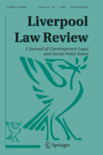
TEXAS LAW REVIEW
Scope & Guideline
Exploring the Frontiers of Law and Justice
Introduction
Aims and Scopes
- Mercy and Criminal Justice:
A consistent focus on the themes surrounding mercy within the criminal justice system, including prosecutor discretion, victim rights, and the implications of mercy in sentencing and clemency. - Constitutional Law and Interpretation:
Exploration of constitutional issues, particularly regarding statutory interpretation, judicial review, and the evolving landscape of rights in the context of contemporary governance. - Corporate Law and Governance:
In-depth analysis of corporate governance, including the implications of corporate decisions on democracy, ethics, and legal accountability. - Litigation and Procedure:
Critical examination of litigation processes, particularly in complex cases such as multidistrict litigation, emphasizing procedural integrity and access to justice. - Technology and Law:
Emerging discussions on the intersection of technology and law, particularly regarding data privacy, artificial intelligence, and the implications of technological advances on legal frameworks.
Trending and Emerging
- Restorative Justice and Mercy:
An increasing number of articles emphasize restorative justice principles and the role of mercy in legal contexts, reflecting a broader societal interest in reforming punitive systems. - Data Privacy and Technology Regulation:
A significant trend towards examining the implications of technological advancements on legal frameworks, particularly concerning data privacy, surveillance, and the regulation of digital platforms. - Corporate Accountability and Governance:
Emerging discussions around corporate accountability, ethical governance, and the implications of corporate actions on democracy and public trust indicate a growing concern with corporate influence in legal and societal spheres. - Interdisciplinary Approaches to Law:
There is a noticeable trend towards integrating interdisciplinary perspectives in legal analysis, including insights from sociology, economics, and technology, indicating a shift towards more holistic understandings of legal issues.
Declining or Waning
- Traditional Civil Rights Issues:
There appears to be a waning emphasis on traditional civil rights issues, with fewer papers focusing on established topics such as racial discrimination or voting rights compared to previous years. - Historical Legal Analysis:
The journal has seen a decline in articles dedicated to historical analysis of legal precedents and doctrines, suggesting a move towards more contemporary applications of law. - Environmental Law:
While environmental issues remain important, there has been a noticeable decrease in the number of publications specifically addressing environmental law compared to the increased focus on corporate governance and technology.
Similar Journals

VANDERBILT LAW REVIEW
Advancing Legal Scholarship with ImpactVANDERBILT LAW REVIEW, published by the Vanderbilt University School of Law, stands as a pivotal journal in the field of legal scholarship. Established in the United States, this esteemed journal has garnered a reputation for excellence, reflecting its Q1 category ranking in Law as of 2023 and achieving a respectable Scopus rank of #207 out of 1025 in the social sciences category, placing it in the 79th percentile. With a history that dates back to its initial issues between 1973 and 1976, it continues to serve as a crucial platform for innovative legal research and discourse. The VANDERBILT LAW REVIEW is dedicated to enhancing legal understanding by publishing rigorous articles that impact both scholarly and practical dimensions of law. The journal remains a vital resource for researchers, practitioners, and students alike, fostering an environment of intellectual engagement and legal inquiry.

Public Law Review
Illuminating Contemporary Issues in Public LawPublic Law Review is a distinguished scholarly journal published by LAWBOOK CO LTD, dedicated to the rigorous exploration and analysis of public law issues. As an essential resource for researchers, practitioners, and students alike, this journal provides a platform for the dissemination of critical legal scholarship, offering insights into contemporary public law developments, theory, and practice. With its commitment to maintaining high editorial standards, the Public Law Review plays a vital role in advancing knowledge and fostering debate within the legal community. Although not currently an open-access publication, it remains accessible through various academic repositories and libraries. The journal's ISSN 1034-3024 ensures its visibility within academic and professional circles, making it an indispensable reference for anyone interested in the evolving landscape of public law in Australia and beyond.

Liverpool Law Review
Illuminating the Intersection of Theory and Practice in LawLiverpool Law Review, published by Springer, is a prestigious open-access journal in the field of law, dedicated to fostering scholarship and promoting dialogue on contemporary legal issues. Since its inception, the journal has evolved significantly, with a publishing history dating back to 1979 and showcasing an extensive range of articles and reviews that contribute to the development of legal theory and practice. The journal is indexed under Scopus, ranking #352 out of 1025 in the Social Sciences category, placing it in the 65th percentile—indicative of its solid reputation and relevance in the field. Liverpool Law Review provides an engaging platform for researchers, professionals, and students alike by facilitating access to high-quality legal research, with full open access available since 2012, ensuring that vital academic discussions are accessible to a global audience. With its commitment to exploring both historical and contemporary issues in law, this journal remains an essential resource for those seeking to deepen their understanding and contribute meaningfully to the legal landscape.

ALBERTA LAW REVIEW
Advancing legal scholarship since 1974.ALBERTA LAW REVIEW, published by the University of Alberta, stands as a key academic journal in the field of law, contributing to the discourse on legal issues and developments in Canada and beyond. With an ISSN of 0002-4821 and an E-ISSN of 1925-8356, this journal has been pivotal since its inception in 1974, providing a platform for legal scholarship that spans a diverse range of topics, from constitutional law to social justice. Although it operates under a traditional subscription model, the journal's illustrious history and rigorously peer-reviewed content affirm its stature in advancing legal research and education. The Alberta Law Review not only serves as a resource for academics and students, but also offers legal practitioners critical insights and analysis pertinent to contemporary legal challenges. With a commitment to enlightening the discourse around law, it is an invaluable asset for anyone engaged in the legal profession or related fields.

UNIVERSITY OF PITTSBURGH LAW REVIEW
Fostering Critical Discourse in Law and Policy.University of Pittsburgh Law Review is a prestigious academic journal that stands as a cornerstone in the field of legal scholarship. Published by the University of Pittsburgh, University Library System, this journal has been contributing to the discourse of the law since its inception, exemplifying a commitment to advancing scholarly work in various legal domains. Although its open access options are limited, the robust collection of articles and commentaries—spanning from 1973 to the present—provides an invaluable resource for researchers, professionals, and students alike. The journal currently ranks in the Q4 quartile within the field of law for 2023, indicating a specialized focus and offering significant opportunities for legal analysis and research. Positioned in a competitive landscape as Rank #784 out of 1025 in Scopus for Social Sciences - Law, it is an essential platform for emerging voices and innovative ideas that shape legal thought and policy. The University of Pittsburgh Law Review continues to foster critical examination and discussion, making it a vital resource for anyone engaged in the study or practice of law.

De Jure Law Journal
Empowering Legal Minds Through Open Access Research.De Jure Law Journal, published by Pretoria University Law Press, is a reputable open access journal that has been serving the legal community since its establishment in 2011. With its commitment to disseminating high-quality research, this journal focuses on various aspects of law and legal principles, encompassing a broad range of topics from constitutional law to international legal frameworks. The journal's ISSN 1466-3597 and E-ISSN 2225-7160 ensure that it is easily accessible and widely recognized in academic circles. Positioned as a significant contributor to legal scholarship in South Africa and beyond, De Jure Law Journal is dedicated to fostering a critical dialogue among researchers, practitioners, and students alike, making it an essential resource for anyone engaged in legal studies.

Denver Law Review
Fostering rich conversations in the legal community.Welcome to the Denver Law Review, a distinguished journal published by the University of Denver, Sturm College of Law that serves as a pivotal platform for the exploration and discussion of contemporary legal issues. With its ISSN of 2469-6463, the journal has established itself within the legal scholarship community, holding a notable Q2 rank within the field of Law according to the 2023 category quartiles. The Denver Law Review is committed to advancing legal research and scholarship, providing open access to critical insights and analyses essential for practitioners, scholars, and students alike. With an impact factor bolstered by its Scopus ranking at 620/1025, the journal facilitates rich scholarly conversations and promotes the understanding of the law in today's dynamic context. We invite you to explore the innovative articles and research that contribute to the evolving landscape of jurisprudence.

CRIMINAL LAW JOURNAL
Navigating the complexities of criminal jurisprudence.CRIMINAL LAW JOURNAL, published by LAWBOOK CO LTD, serves as a critical resource for legal practitioners, scholars, and students in the field of criminal law. With a dedicated focus on advancing the understanding of legal principles, case law, and statutory developments, this journal provides insightful articles, case analyses, and commentary from leading experts. Although it does not currently offer Open Access options, its rigorous peer-review process ensures the publication of high-quality research pertinent to contemporary issues in criminal law. The journal aims to foster academic discourse and promote best practices within the legal community. By maintaining a strong commitment to legal scholarship and education, the CRIMINAL LAW JOURNAL stands as a prominent platform for disseminating vital knowledge that influences policy-making and legal reform.

FORDHAM LAW REVIEW
Exploring the Frontiers of Law and JusticeFORDHAM LAW REVIEW is a prestigious legal journal published by Fordham University, School of Law, based in the United States. Established to disseminate cutting-edge legal scholarship, this journal has consistently achieved an impactful standing within the field, evidenced by its category ranking as Q1 in Law for 2023 and its Scopus ranking of #428 out of 1025 in the Social Sciences Law category, placing it in the 58th percentile. The journal welcomes submissions across diverse legal topics, fostering discourse that advances both legal theory and practice. Although it does not currently offer open access options, the Fordham Law Review serves as a vital resource for scholars, practitioners, and students seeking insights into contemporary legal challenges and developments. With its rich publication history dating back to the converged years of 1973 through 2024, the journal continues to be a cornerstone for rigorous legal analysis and a platform for influencing the evolution of law.

WASHINGTON LAW REVIEW
Connecting Researchers, Practitioners, and StudentsWASHINGTON LAW REVIEW, published by the University of Washington School of Law, is a premier legal journal that plays an essential role in the dissemination of scholarly work in the field of law. With a longstanding commitment to excellence, this journal has been pivotal in shaping legal discourse since its inception. It is ranked in the Q2 quartile in Law, as per 2023 evaluations, and holds a notable position within the top 54th percentile of its category on Scopus. The journal’s extensive publication history, covering years from 1973 to 2024, provides a rich repository of legal scholarship, making it a valuable resource for researchers, practitioners, and students alike. While the journal does not currently offer open access, its authoritative articles cover a diverse array of topics within legal studies, ensuring that the most relevant and impactful discussions are accessible to the academic community and beyond. For those looking to stay informed about cutting-edge legal issues and advancements, WASHINGTON LAW REVIEW remains an indispensable asset in the pursuit of knowledge and advocacy in the realm of law.